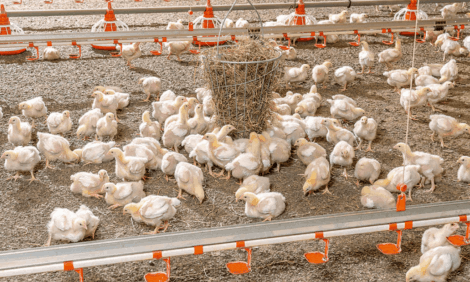



Effects of Dietary Gossypol Concentration on Growth and Health of Meat Ducks
Gossypol is an anti-nutritive factor found in cottonseed meal. A Chinese experiment suggests that total gossypol in the diet of meat ducks up to three weeks of age should not exceed 929mg per kg, and free gossypol concentration should be less than 77mg per kg.The objective of this study at Sichuan Agricultural University was to determine the effects of gossypol from cottonseed meal (CSM) on growth performance, blood biochemical profiles and liver histopathology of ducks, report Q.F. Zeng and colleagues in the current issue of Poultry Science.
They randomly allocated 900 day-old ducks to five treatments with 12 pens per treatment and 15 ducks per pen.
The five experimental diets were formulated in such a way that 0% (a corn-soybean meal basal diet, diet 1), 25% (diet 2), 50% (diet 3), 75% (diet 4), and 100% (diet 5) of protein from soybean meal was replaced with that from CSM. All diets were formulated on a digestible amino acid basis.
The experiment included two phases: the starter phase (one to three weeks), when the test diets contained graded levels of CSM, and the growth phase (four to five weeks), when the birds were fed a corn-soybean basal diet to examine the recovery of ducks after CSM withdrawal.
Dietary CSM and gossypol linearly (P<0.01) and quadratically (P<0.01) decreased average daily gain and average daily feed intake for the first 14 days.
The threshold of daily total gossypol (TG) and free gossypol (FG) intake based on average daily gain from days 1 to 7 and days 7 to 14 were 32.20 and 2.64mg per day, and 92.12 and 9.62mg per day, respectively.
Serum alanine aminotransferase increased (P<0.05) linearly with increasing level of gossypol in the diets (day 7), whereas aspartate aminotransferase increased (P<0.05) linearly and quadratically (day 14).
Serum albumin concentration decreased (P<0.05) quadratically with increasing dietary CSM concentrations on day 21.
The degree of damage to the liver increased markedly with increasing dietary CSM and gossypol content and the length of CSM and gossypol intake.
On day 35, there was no difference in bodyweight or blood profiles of ducks among all treatments.
The Chengdu-based researchers conclude their results suggest that meat ducks’ dietary total gossypol and free gossypol concentrations should not exceed 928.9 and 77.2mg per kg, respectively, between 1 and 21 days of age. They added that a two-week withdrawal of diets containing gossypol should be considered.
Reference
Zeng Q.F., G.L. Yang, G.N. Liu, J.P. Wang, S.P. Bai, X.M. Ding, Y.H. Luo and K.Y. Zhang. 2014. Effects of dietary gossypol concentration on growth performance, blood profiles, and hepatic histopathology in meat ducks. Poultry Science. 93: 2000-2009. doi: 10.3382/ps.2013-03841
August 2014











